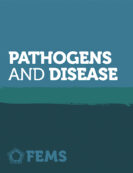FEMS Microbiology Letters Flash Presentation Award: Marine Cambon
We send our congratulations to Marine Cambon, who won the Flash Presentation Award at MMEG 2021, sponsored by FEMS Microbiology Letters.
 The Molecular Microbial Ecology Group (MMEG) meeting was held on 1-2 December 2021 at the John Innes Centre in the UK. Marine’s winning flash presentation was titled “Chemical cues as potential triggers of Brenneria goodwinii pathogenicity in Acute Oak Decline”.
The Molecular Microbial Ecology Group (MMEG) meeting was held on 1-2 December 2021 at the John Innes Centre in the UK. Marine’s winning flash presentation was titled “Chemical cues as potential triggers of Brenneria goodwinii pathogenicity in Acute Oak Decline”.
Read our interview with Marine about her research below:
What is your current position, and what was your scientific journey to get there?
I completed my BSc, MSc, and PhD in ecology and evolutionary biology in Toulouse, in south of France. My first scientific interests have been in host-pathogen interactions, and my doctoral work focused on a bacterial insect pathogen. I studied its short-term evolution within the host as well as its interaction with the host microbiome. After my PhD, I steered away from pathogens for a while and went to Bordeaux for a postdoc position to study the microbiome of trees, and its role in tree drought stress monitoring and tree drought tolerance. I am currently a postdoctoral researcher at Bangor University (North Wales, UK) in the Molecular Ecology and Evolutionary Biology group, where I can combine my interests in pathogens, microbiomes, and trees, working on Acute Oak Decline.”
Could you describe the research your presentation covered?
I presented at MMEG 2021 my work within the BAC-STOP project which aims at understanding Acute Oak Decline in the UK. This disease affects mature oak trees and is a consequence of a polymicrobial infection. In addition to the presence of bacterial pathogens, the infestation of a bark boring beetle is most of the time seen, and although we start to know all the protagonists on stage, we don’t understand yet how they interact with each other in the pathosystem. Understanding those interactions is the aim of my project. More precisely, I am interested in identifying potential chemical cues produced by the bark boring beetle Agrilus biguttatus which could be responsible for the virulence gene expression of the bacterial pathogen Brenneria goodwinii. I work in close collaboration with my colleagues in Forest Research and Rothamsted Research, combining wood log infections with chemical ecology and molecular biology techniques, to hopefully understand the nature of this bacteria-beetle interaction.”

What do you hope to focus your research on in the future?
In general, I am thrilled by complex diseases. I hope to further investigate how pathogens interact with several species – a host, a host microbiome, sometimes a vector, other pathogen species or strains, and how this influences their evolution. Understanding what benefice each partner may have in an interaction can not only give insights in the evolutionary history of these species but can also bring essential knowledge to further fight the disease, in plant as well as animals. But I must admit that I have a slight preference for trees!”
–
We use income from the FEMS Journals to fund grants, awards, and projects, and to support our knowledge sharing events and initiatives. Consider publishing your research with our journals to help the global microbiology community.
All but one of the FEMS journals are fully open access (OA), with one journal, FEMS Microbiology Letters, offering free-to-publish and OA options. Open access is key to supporting the FEMS mission of disseminating high quality research as widely as possible: when high quality, peer reviewed sound science is open access, anyone, anywhere in the world with an internet connection, can read it.







